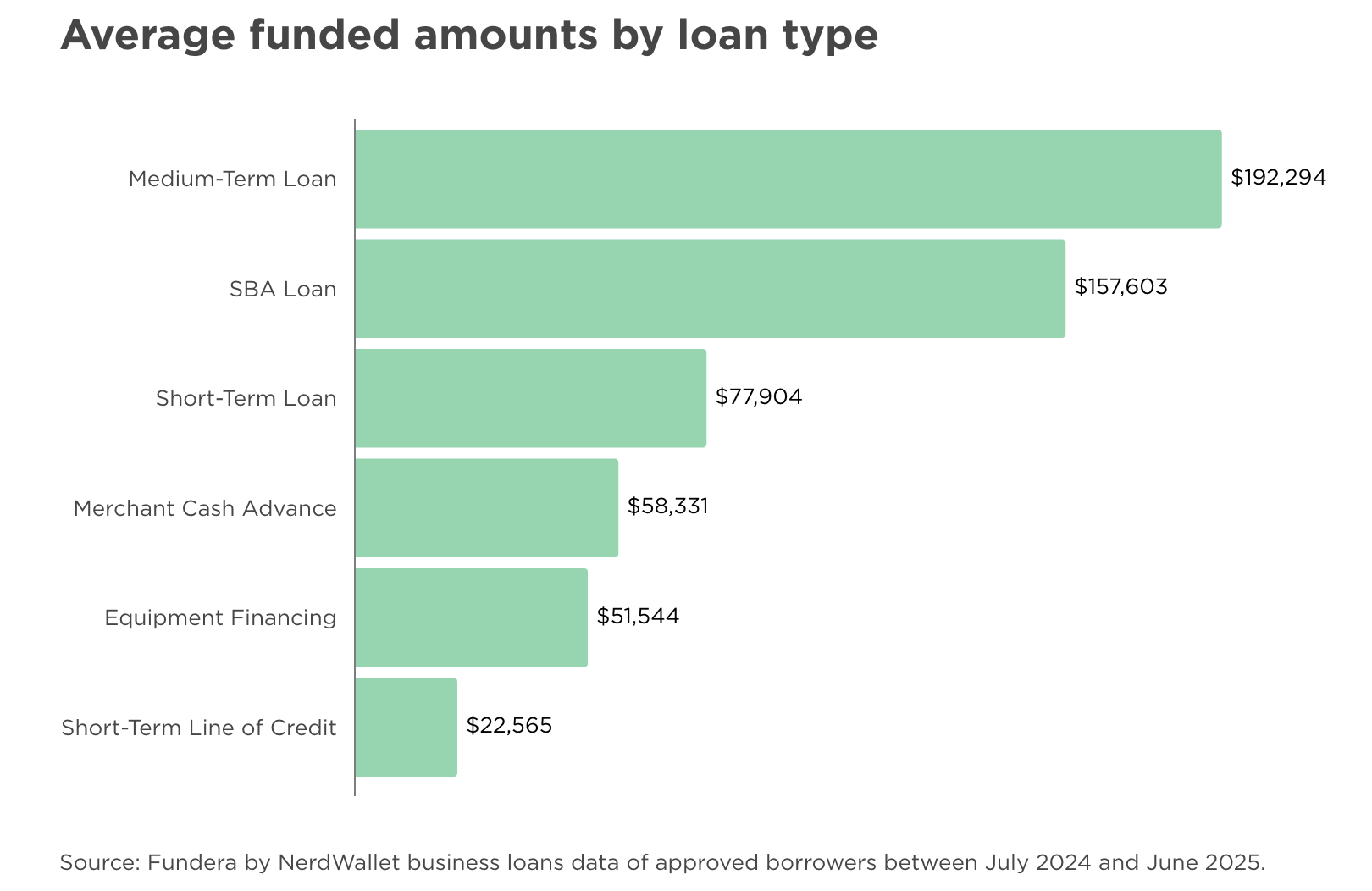The Average MCA Deal? $58k Report Says
January 26, 2026According to NerdWallet, a leading business loan matching marketplace, the average funded amount of an MCA deal is $58,331. That’s based entirely on the company’s own internal data from July 2024 to June 2025.
Medium-term loans (2-5 years) came in with the highest average of $192,294 and short-term lines of credit produced the lowest average of $22,565.

NerdWallet depends heavily on web traffic to generate leads so this is potentially representative of merchants who use Google or ChatGPT to find financing versus all possible channels.
How a Mother-Daughter Broker Shop Persevered and is Positioned for Growth
January 15, 2026Sharpe Capital facilitated nearly $5 million in funding to small businesses across the United States in 2025. Next year, they hope to double it. What makes the company unique is that it operates as a mother-daughter team, one of the very few in the industry to be structured that way. But how Wendy Rivera and her mother, Sonia Alvelo, got there is a story of circumstances and perseverance.

Alvelo is a known entrepreneur in the space through her own small business finance brokerage Latin Financial, but technically she was also associated with another brokerage at the same time, Sharpe Capital. Her business partner and life partner, Brendan Lynch, co-founded Sharpe with her more than a decade ago, but Lynch primarily ran Sharpe while Alvelo ran Latin, sister companies of sorts but with separate operations. The two celebrated a grand opening of a big joint office in Wethersfield, CT in 2022, which was attended by deBanked and a slate of local politicians. The Sharpe team wore green shirts and the Latin team wore blue.
Sadly, Lynch passed away in December 2024 from cancer at only 45 years old, but not before he could finally tie the knot with Alvelo, making her known as Alvelo-Lynch once and for all. Lynch’s last interview with deBanked happened four months before he passed and one of his final messages he had hoped to get out through us was a reminder for people to remember to take care of their health.
In the challenging time afterward, Alvelo took the reins of Sharpe and eventually her daughter, Wendy Rivera, emerged as a key reason the company continues to be successful.
Rivera, Connecticut-born and raised, had originally been working in retail when she became curious about her mother’s and Lynch’s business in 2018. When working for them became a possible next step for Rivera, they didn’t give in to nepotism and made her interview as a candidate just like anyone else. But she turned it around on them.
“They would tell you that I interviewed them in regards to what the company was and everything like that, but I asked the right questions,” Rivera told deBanked. “Everything was moving smoothly, and I decided to move forward.”
It started off as a part-time gig and eventually became full-time. Her role was to bring in deals and work closely under the tutelage of Lynch, who had a natural knack for connecting with people, particularly small business owners.
“They had a special place for him in their hearts,” Rivera said. “Brendan has taught me so much. He pretty much taught me this industry. I’ve worked with him side by side for the past seven-plus years.”
Rivera obviously learned from her mother as well, but Alvelo’s typical Latin Financial client was primarily from within the Spanish-speaking community while Sharpe’s was much more broad. To give some perspective on that, Alvelo, for example, says that today 80% of her entire Latin Financial customer base resides in Puerto Rico.
So Rivera spent her time on Sharpe and now she’s the primary person responsible for its operations. In what was a transitional year fraught with grief and challenges, the two revamped everything to focus on efficiency. Now they’re finally getting back to thinking about how to expand.
Along the way, Rivera realized that relationships in this business have a tremendous impact and can serve as its own form of marketing.
“Honestly, what’s been working for us is word of mouth,” Rivera said when it comes to acquiring customers. “Really. It sounds very old school but it really works. Once you take care of one merchant, they’ll tell their friends or whoever the case may be, and then they’ll reach out to us, and it just keeps growing that way.”
But those referrals wouldn’t come if they didn’t have the right funders in place to help them out. That means they have to know and trust who they are doing business with on the other side. Coincidentally, attending deBanked events, which Rivera has done, has been an eye-opening experience for her in getting to see who they are working with.

“I feel like once you actually meet the person, I don’t even think a phone call will do enough, you get a feel for what kind of person they are, and if they are in the industry for the right reasons,” Rivera said.
And in all those meetings, another thing she’s realized is that being part of a purely mother-daughter team is unique even within the family business segment of the industry which tends to lean toward father-son. But the two talk business just like any other shop: during work, after work, even during dinner they talk about deals.
Though it’s been a lot and Rivera says she’s overdue for a vacation, she says it’s a job she really enjoys.
“If you love numbers, if you love people, if you love helping people, I think it’s definitely a great position to be in,” Rivera said of working in the industry. “But you have to also be in love with the job as well. Because if you’re not in love with it, there’s going to be a lot of things that’ll hold you back.”
The motivation now is just to pick back up and have an even bigger 2026.
“Brendan and my mom had different ways of running their companies, Sharpe and Latin Financial, and so I feel like [Brendan] kind of taught me his kind of ways for Sharpe Capital and also maybe leaving an open door for opportunities down the road as well,” Rivera said. “And now that I’m in that spot, I can see that.”
Factor Gives Update on “Killing MCAs” in Texas
January 9, 2026Cole Harmonson, CEO of Dare Capital and a board member for the American Factoring Association, posted an update last month on the recent Texas MCA legislation and campaign to “fight the MCA cronies.” It appeared on the Commercial Factor’s magazine website. You can read it here.
Harmonson shared his strategy on how to kill MCAs in Texas, which focuses mainly on the DACA component of securing a first position: “If you get the Springing DACA, then the bank will not give anyone else (i.e., an MCA) a DACA, and therefore no MCA can legally sweep your customer’s account, thereby killing the MCAs in Texas,” he wrote.
Harmonson had previously shared that the factoring industry had been responsible for the MCA legislation in Texas and that it served as a “blueprint,” suggesting that a similar legal framework could be attempted in other states.
Walmart MCA Video Commercial
January 5, 2026Want to see how Walmart is marketing its MCA program?
Check out this commercial:
Walmart became a direct merchant cash advance funder in 2024. You can learn more about it here. Walmart also works with third parties such as Payoneer, Parafin, and Uncapped.
Brokers and Funders – Are You Ready for Changes to California Law Effective January 1, 2026?
December 20, 2025Bob Gage is a partner in Hudson Cook, LLP’s Michigan office. Kate Fisher is a partner in Hudson Cook, LLP’s Maryland office. https://www.hudsoncook.com/
California has a new law, California S.B. 362, impacting how brokers and funders communicate with merchants starting on January 1, 2026. The new law adds provisions to California’s Commercial Financing Disclosures Law (“CFDL”) which became effective in 2023 and established the first law requiring commercial financers and brokers (described in the CFDL as “providers”) to provide cost-of-funding disclosures to applicants. Here is an overview of what you need to know:
Don’t Say “Factor Rate”
Under S.B. 362, commercial financing providers are not allowed to use the term “rate” in a manner that is likely to deceive a recipient. A “recipient” is generally a person who receives an offer of commercial financing of $500,000 or less. The preamble to the new law (which is not part of the law but informs how the regulator will approach enforcement) gives the following example of what California means by likely to deceive:
- Describing the price of credit as “X% fee rate” or “Y% factor rate,” particularly when those “rates” diverge materially from the APR.
A factor rate will almost always be much lower than any APR. This means that California has effectively banned use of the term “factor rate” when communicating with applicants for loans, sales-based financing, merchant cash advance and yes – even factoring transactions. It is probably safe to talk in terms of “factor rates” internally. But, starting on January 1, 2026 – saying “factor rate” to a California recipient can get you into hot water.
Don’t Say “Interest Rate” Unless Referring to an Annual Simple Interest Rate
S.B. 362 also prohibits commercial financing providers from using the term “interest” in a manner that is likely to deceive a recipient. The preamble to the new law gives the following examples of what California means by likely to deceive:
- Describing the price of credit as “simple interest” when referring to a nonannual rate as opposed to a noncompounding annual rate that a reasonable person would understand “simple interest” to mean; and
- Describing the price of credit as an “interest rate” when describing a daily, weekly, or monthly rate and not an annual rate; and
This potentially impacts providers who describe the cost of commercial credit using a daily or weekly rate and describing that rate as “interest”. For example, loan agreements that use a daily, weekly, or monthly “interest rate” may need to be modified.
California Requires Brokers and Funders to Remind Recipients of the Disclosed “APR” or “Estimated APR”
S.B. 362 complicates post-offer negotiations between providers and recipients by requiring redisclosure of the APR or Estimated APR calculation already required by the CFDL. It does this by adding the following new provision to the CFDL:
- After extending a specific offer to a potential recipient, whenever a provider states a charge, pricing metric, or financing amount to the potential recipient for that specific offer during an application process for commercial financing, the provider shall also state the annual percentage rate of that commercial financing offer by using the term “annual percentage rate” or the acronym “APR.”
What this means for providers:
- The APR reminder requirement applies “during an application process.” The term “application process” is not defined, but it probably does not end until the recipient receives funding or the provider definitively declines to proceed with the financing.
- During the “application process,” anytime a provider communicates with the recipient and states a charge, pricing metric, or financing amount, the provider must remind the merchant of the APR or Estimated APR for that offer. Here are examples of how this might impact brokers and funders:
|
New York Already has a Similar Law
New York already has similar requirements in its Commercial Financing Disclosure Law. See 23 N.Y. Admin. Code Section 600.1(f)(1). Accordingly, brokers and funders should implement these practices in New York as well.
This is only a high-level overview and not legal advice. If you have questions regarding how these laws impact your business, please contact knowledgeable counsel.
Bob Gage is a partner in Hudson Cook, LLP’s Michigan office. Kate Fisher is a partner in Hudson Cook, LLP’s Maryland office. https://www.hudsoncook.com/
How Daniela Cano and Nicole Paliobeis Originate More than $100 Million in Funded Deals a Year
December 19, 2025Daniela Cano and Nicole Paliobeis account for $10 million in revenue-based financing volume every month at Spartan Capital. That’s $120 million annualized. As the top two ISO relationship managers in the company out of eight total, Cano and Paliobeis operate in one of the most pivotal roles in the industry.
“It’s extremely fast paced, not one day is ever the same,” says Paliobeis, whose official title is Business Development Manager. “It’s always different between the person that you’re speaking to at your broker shop or your partner.”
Dozens of stories have detailed the high-octane lifestyle of what it’s like to be a broker, but the deals they originate don’t get funded unless they’re in sync with the right people at the right funding shops. Funders know this, so whom they choose to handle this part of the business is among the most important decisions they can make. After all, a funder can’t fund anything without deals coming in the door.

B2B Finance Expo 2024
“We’re the middleman between the deal going into the system, expediting the deal, getting that approval, the competing aspect of it, contracts, funding, going back and forth with the underwriter to get the deal done,” says Cano, who is the Director of Business Development.
“Our days do not end at 6pm eastern time, our days will end sometimes at 10 or 11 o’clock at night,” Cano adds. “We both have brokers that are on the West Coast, we have brokers that are traveling, just like we would be traveling. So I think part of it is we try to give them that customer service that they want.”
Cano also says that it’s not just late nights but also early mornings, when calls and texts can start rolling in at 7am, even before underwriters are in the office.
“Typically, I always have my laptop on me no matter the time of the day,” says Paliobeis. “And if somebody calls me or they need a contract or they need a bank verification and it’s like an SOS emergency. I’m like ‘Hang on, hold on, hot spot, sign on, send everything over to them. Your docs are in your Merchant’s inbox’ and then go from there.”
For Cano, her edge is that she’s worked in the industry for 14 years. Originally starting at a broker shop herself, she eventually switched sides and became an ISO relationship manager at a time when, she says, there were very few women in that role. That statistic, she adds, has changed significantly since. In the beginning, she was occasionally on the receiving end of comments that were less than kind, but that has become much less common over time.
“Eighty percent of my ISO partners are male, and then the rest are women,” says Cano. “And those women are going to be like the heads of strategic partnerships, funding managers, or they’re the ones that are moving a lot of the volume for the broker shop.”
Paliobeis puts her clientele in the 80–90% male range, at least as far as whom she interacts with at each company. Broker shop owners themselves still appear to be overwhelmingly male, though there is no precise research that nails down the percentage. Cano says she’s found the male-dominated aspect of the broker business surprising, but that it should not be viewed as intimidating to any woman considering entering the space.
“Don’t be scared of that male figure aspect of it,” she advises. “For any woman, just don’t be scared, just definitely go forward and do it.”
 Paliobeis, who comes from a background in luxury home sales and luxury retail sales and is now in her fourth year of small business finance, has found joy in realizing that her past experience can open doors in this space. For more than five years, she was a connoisseur of high-end watches—an accessory that some brokers are very into. Rolexes, for example, are something she commonly sees on wrists at industry conferences, along with the occasional Patek Philippe, Audemars Piguet, or even a Richard Mille.
Paliobeis, who comes from a background in luxury home sales and luxury retail sales and is now in her fourth year of small business finance, has found joy in realizing that her past experience can open doors in this space. For more than five years, she was a connoisseur of high-end watches—an accessory that some brokers are very into. Rolexes, for example, are something she commonly sees on wrists at industry conferences, along with the occasional Patek Philippe, Audemars Piguet, or even a Richard Mille.
“Every once in a while I see a watch and I’m like, ‘Oh, that’s really nice,'” says Paliobeis.
But relationship-building takes time in this industry, and to do it right, it can’t be surface level. Cano says that a good partnership effectively means making someone a personal friend—letting them into your personal life via Facebook or Instagram, knowing each other’s birthdays, or knowing when and whom they’re getting married to. Paliobeis offered her own example, saying she had recently been introduced to a partner’s family.
“At the end of the day we’re human,” says Paliobeis. “We’re talking to you every single day, like things are going to come up with your family, or day to day, life and so on.”
Having that bond comes in handy because sometimes the brokers themselves run into communication troubles with their merchants and get stuck. When that happens they can ask Cano or Paliobeis if they can step in and talk to the merchants to get over a hurdle, which they’ll do.
Though the two are essentially on the same team and are often seated next to each other in the office, they work with their own book of relationships and compete on deal volume.
“Always every day probably around noon, and then around 5:30 we’re like, ‘what’s your number?'” says Cano, as they try to beat each other out on units funded. They hope the competitive camaraderie will eventually propel them to doing a collective $40 million a month, or nearly half a billion dollars a year.
“We compete and it’s friendly competition, but we’re also rooting for each other,” Cano says. “So even if it’s not Nicole or myself, or it’s one of the ISO managers that are getting a big deal, or if they just started and they’re new in the industry and they did something, we have a gong, and we bang the gong.”
 Coincidentally, one of the other Spartans is Cesar Valero, a business development executive who won the B2B Finance Expo poker tournament in 2024 in Las Vegas, got featured in a writeup last year, and is now the company’s Director of Revenue. Suffice it to say, the Spartan Capital team are familiar faces in the industry.
Coincidentally, one of the other Spartans is Cesar Valero, a business development executive who won the B2B Finance Expo poker tournament in 2024 in Las Vegas, got featured in a writeup last year, and is now the company’s Director of Revenue. Suffice it to say, the Spartan Capital team are familiar faces in the industry.
Beyond that, there are a couple of other ingredients that make what they do possible. One is the ability to stand on a brand with modern technology. Cano says that many brokers today are fintech-savvy and have certain expectations around the submission and approval process, including that deals be API’d into their system—something that accounts for most submissions at Spartan Capital. The other ingredient is strong leadership at the top.
When it comes to working for Frank Ebanks, the company’s CEO, Paliobeis says she “loves it.”
“[Frank’s] a very hands-on CEO,” she says. “He’s always available. If we need something and we’re here in the office, we can just go knock on his door and just say, ‘hey, need you for this, I want to pick your brain’ and so on. So it’s very nice to have that.”
Cano says that just as she and her colleague take calls early in the morning or late into the night, Ebanks does the same for them when they need him.
“He does give that role model aspect that this is how you grow a company, that this is how you do it,” Cano says. “And he’s crushing it.”
“I tell Frank, ‘I’m growing old here, so I’m gonna stay here,’ I actually really like my current role and the company I’m with and the partners we work with,” Cano adds. “We have the team, we have everything.”
And so while funders compete and do the dance to maximize deal flow, being among the top ISO relationship managers in the space is, overall, an enjoyable experience, they say.
“It’s the friendships that you’re building, everything that’s happening, I love it,” Cano says. “I wouldn’t change it for the world. It’s chaos and it’s chaotic, and every day is different… I love that you’re able to see different businesses and help them out. So I truly, truly like this part of it.”
Success and Lessons Learned From Small Business Finance Industry Vets
December 11, 2025 “In October, the company did $23 million+ and it was our best month ever,” says Eddie DeAngelis, founder and CEO of QualiFi, a full-service business loan brokerage.
“In October, the company did $23 million+ and it was our best month ever,” says Eddie DeAngelis, founder and CEO of QualiFi, a full-service business loan brokerage.
Talk to anyone in the industry and it always seems to be their best month, quarter, or year, but that’s just happenstance since those same people will also tell you—if they’ve been in it long enough—that success is not a straight shot up. They’ll also say that success is defined on their own terms, not by other people’s measures.
In DeAngelis’ case, for example, the origination figure, which comprised a mixture of LOCs, term loans, HELOCs, SBAs, and equipment financing, is all the more celebratory because the company accomplished it with just 13 funding reps at the time.
“It just shows how efficient our business model is,” DeAngelis says, “so that’s the number that I’m really proud of, which is 13 reps.”
Jared Weitz, CEO of United Capital Source, a small business finance marketplace, had a similar perspective, sharing that at one point he had 27 employees and now operates with 17—but the 17 are producing the same output as the 27.
“Ten less people, less expenses, same numbers, higher net margin and profit,” Weitz says. He explained that he spent time dissecting his P&L, structures, and systems to maximize efficiencies to get where he wants to be.
“I’ve always viewed it as ‘am I profitable every year?’” Weitz says. “‘Do I have concentration where, if 3,4, 5, [lenders] in my portfolio go out, am I screwed? Can I grow without body count? Can I create more efficiencies in my business through automations, technologies, different marketing and grow without body count?’ I’ve done that very well.”
Zach Ramirez, CEO of Calldrive, a pay-per-call marketing and consulting company, also has experience running brokerage shops.
“I found that my skillset, I was great at sales. I still am good at sales, but I think my real skill is building operations. I’ll be honest, one of my weaknesses is I’m not really that great at managing big groups of people,” Ramirez says.
In this regard, Ramirez also thought deeply about maximizing efficiencies rather than maximizing headcount, and says that “I found that what I do enjoy doing is building the infrastructure, the marketing, the sales processes, all the metrics and KPIs, and building the CRM and all the automations.”
Between that and his mountain of firsthand experience working at and operating brokerages, Ramirez is often called upon these days as a consultant for ISOs to help fix or improve all of those things.
Chad Otar, CEO of Lending Valley, a revenue-based financing provider, shrugs at the milestone benchmarks some of his competitors tout and explains that it’s not a race for publicity but rather a marathon of good economics. Otar, for example, says his company funds from its own self-funded balance sheet and has no incentive to be anything less than prudent.
“I’m not looking for market share,” Otar says. “I’m just looking for, you know, a calm, collected life at the end of the day.”
Through all the years Otar has been working in the industry, he says he’s seen the cycle of jaw-dropping deals that, while they may still be more expensive than a bank loan, are unlikely to yield a financial incentive for him to risk participating in.
“And I’m like, no, no. I’ll just stick to what I know, stick to what I like,” he says.
All four executives have the benefit of experience under their belts. Otar has worked in the industry for 19 years, Weitz for 20, Ramirez for 16, and DeAngelis for 12.
What they all have in common is a deep love for the game.
“It’s a delight, I love this #$@&*!-ing industry,” Ramirez says.
“I wouldn’t trade it for the world. I love this industry a lot,” echoes DeAngelis.
Weitz and Otar expressed similar sentiments.
DeAngelis, who had a couple of decades’ worth of experience as a traditional business owner in screenprinting and designer fragrance wholesaling, says that he loves talking to business owners, overseeing operations, and building relationships with partners.
Weitz says it’s been a joy to watch long-term members of his team go through their own life milestones, like going from an apartment to marriage to a home to kids.
“They’ve seen growth also, which really also means we’ve shown growth to not just our clients but our staff,” Weitz says. “These are really good recognition signs that we’re doing pretty good, which is also how I define success.”
If you’re earlier on in your career or entrepreneurial journey, know that there are going to be rough times—especially in this industry.
“My very first job selling finance was for [a mentor],” says Ramirez. “I was probably 19 or something, or 20, and he always said, ‘when you build your business, put your blinders on and only focus on your business and you’ll be instantly rich in 20 years.’”
Ramirez says that the march toward success is kind of like going to the gym. There are people who give up on a routine after three months because they think they’ve put in enough time to judge the final outcome and never truly follow through. And then there are those who stick with a routine, realize that they’re incrementally moving toward their goal, and eventually get there. Ramirez says he has been guilty of surrendering too soon in the past and has also fallen victim to shiny object syndrome. In one example of the latter, he said his previous ISO became overly caught up with selling Employee Retention Tax Credits (ERTC/ERC) during COVID, to the point where it overwhelmed and negatively impacted what had been a well-run business.
“It was a waste of time and energy more than anything, but also cash, because I didn’t remain true and focused to my major core expertise or my core area of competency,” Ramirez says. “I think we lost probably over a full year. We went the wrong direction.”
Otar, meanwhile, says he has felt the pressure as a funder in an increasingly competitive environment with demanding brokers. In one example, he says that while he normally sticks to his principles about not doing same-day fundings, he became convinced to make an exception—and it came back to bite him.
“I did a same-day funding and the next morning on the first Decision Logic, there’s four different positions in there already.”
In his view, that completely changed the risk profile of the deal and produced immediate regret. “That’s why I’m not advocating for same-day funding. I am not advocating for [online] checkouts,” he says. “I’m not doing any of that. I’m still sticking to what I know best, and it’s the reason why I have longevity in this industry.”
Otar adds that he is still employing automation, tools, and systems, and running a modern operation, but he thinks very carefully about each decision.
For Weitz, one of the big defining moments in his business was realizing that concentration risk can be existential. In an industry that prides itself on strong relationships, putting too many eggs in one basket can produce unforeseen consequences if a lender or funder disappears. And what are the odds? High enough that it happened to him. In the early days of United Capital Source, two large funding partners ceased operations at the same time, one of which comprised nearly half of his company’s entire portfolio. That not only jeopardized renewals but also the valuable volume bonus relationships he had with both.
“I know plenty of large brokers who make their profits solely from volume bonuses,” Weitz says. Fortunately, he recovered—and it gave him the chance to refactor his strategy to mitigate future fallout.
DeAngelis says that things can go from great to not good at all in a very short time. In one example, he said that six months after being featured positively in a deBanked story in early 2023, his company QualiFi hit such a snag that he had to temporarily take himself off payroll.
“We just ran into this down spurt where we had a really bad month,” DeAngelis says. “We’ve been there before, right? Another month, another really bad month. ‘Okay, so now back-to-back months. What’s going on? June, July, another bad month. Now it’s a bad quarter,’ and we just were spiraling down, like revenues dropping 30%, we’re starting to stress with the bills, like, ‘what the hell’s going on?’”
They knew they didn’t forget how to execute, but they made tweaks where they could. Like Ramirez’s gym analogy, DeAngelis said they didn’t completely change what they were doing—they stayed the course.
“Our answer was to just keep our heads down, just keep pushing, make some changes and start watching what we’re spending and just barrel through and push through,” DeAngelis says. “And then when we got to October [2023], is when things started to turn for us.”
Two years later, that recent $23 million funding month is a milestone that arose from going through the bad to get to the good. The last several months have also come in at over $15 million.
Some founders try to leverage milestones into additional growth before they’re ready, but DeAngelis—who has been down this road before, including with a previous company he started that was acquired by Nav—says it’s become important to look at each portion of the business as its own business. Hiring and onboarding, for example, has become its own structured operation.
“Before when we lost a rep or we needed to hire someone, we’d hire like the first two to come through the door and just put them on the phones, right?” DeAngelis says. “Those days are done. So the hiring process, we’re super selective. We want to make sure it’s a really good fit for the candidate, as much as this is for us, for long-term sustainability.”
DeAngelis has added a few more reps since the earlier-mentioned 13 and is being cautious about how they approach growth from here.
Ramirez, meanwhile, says that sometimes it helps to look at a problem in reverse. A common gripe these days is that the small business finance market is getting too crowded and squeezing margins (and ethics).
“If I look at everything from the perspective of, ‘I’m an ISO, and there’s more ISOs coming in,’ I understand why they would feel threatened,” Ramirez says. “Because… we’re all fighting for the same pool of merchants, essentially. I would respond with, ‘well, why don’t you help them?’ Instead of being fearful, then why don’t you help them? Why don’t you find these other smaller ISOs and help them do business the right way. Consult with them, charge them for that.”
Ramirez’s outlook embraces the spirit that success in the industry is not limited to being the best broker or the best lender, but about spotting opportunities and being brave enough to capitalize on them.
For Weitz, that meant diversifying early on beyond just one product. United Capital Source offers LOCs, HELOCs, SBA loans, term loans, revenue-based financing, equipment financing, and more. The result is long-term client relationships that shift between products as needs evolve—some going back to the company’s inception 15 years ago. Weitz also notes that not all new competition is real competition: his team conducts themselves with a level of expertise and best practices that they believe clearly distinguishes them.
For Otar, seeing a crowd rush into something doesn’t necessarily indicate a real opportunity, at least not economically. Unless the play is for market share or another specific objective, he considers patience and vigilance his advantages.
“I’ve been through the ringer,” Otar says. “I started this a long time ago. I was an opener, I was an originator, I was a collection guy, I was an underwriter, I’ve seen it all. I don’t think there’s one area in this industry that I haven’t been able to cover yet.”
“I’m here for the long run, not overnight,” Otar adds. As part of that, he prides himself on relationships not only with brokers but with every merchant he funds.
“My mom, when I first started, she had said this, ‘there’s three things that you don’t mess around with in people’s lives: their money, their spouse, and their car.’”
Realizing that his business involves one of those three, he has made it his mission to manage it with care.
“If you look at Lending Valley’s reviews, we’re at 5.0 right now, every single one of them. You could give them a call and they’ll be like, ‘Chad is amazing,’ because I try to keep them on with me.”
For DeAngelis, part of success is giving back. For example, they recently started a charity drive in the office where each month a different employee selects a charity and the company donates to it.
“We started with a small donation of like $500 a month,” DeAngelis says. “And it started really catching on, and I loved it, and got everybody involved. And we talk about it every month. Somebody picks a charity, tells us why it’s special to them, and then they give us some updates on it.”
“I just want to say that ever since we started doing that, even when we were struggling, our business just literally made a skyrocket transformation,” DeAngelis adds. “Over the last year, we’ve doubled and tripled and almost quadrupled our fundings and our revenues.”
For Ramirez, he says that “Last year was one of the best financial years of my life.” He used some of the earnings from it to acquire a small telecom company, which has become another valuable component of his overarching strategy. For younger people entering the space, he’s certain that this business is here to stay.
“The industry is not going anywhere,” he says. “Is it going to fluctuate? Is it going to change? Absolutely.”
Weitz, now two decades in, also concludes that by any rational measure, this business will continue to provide opportunities—as long as one evolves with the times.
“People are always going to need homes,” Weitz explains. “People are always going to borrow against assets. Businesses will never go away, ever, ever, ever, and they will also never, ever, ever have enough capital to grow themselves. They’re always going to need an outside source. This is the way the world has worked for a thousand years. So that won’t change. How people access it will change. The cost will change. The products will change. The need will not. So as long as you’re shifting with that, you’re in an industry where that need is still abundant.”
Otar says, “At the end of the day, I’m very happy with what I do every day. It makes me excited to wake up and actually want to go to work. It’s like I don’t have a job per se. They say, ‘if you have something that you love to do every day, it’s not a job.’ It just becomes a habit at this point. And I enjoy my habit.”
Scott Pearson Is Retiring, But His Influence on Alternative Finance Will Remain
December 9, 2025In the footnotes of virtually every legal brief detailing merchant cash advance history is Richard B. Clark v. AdvanceMe. Filed as a class action in 2008 by a restaurateur in Orange County, California, Clark alleged that the merchant cash advance he received was really a usurious loan. When the case settled in 2011 with AdvanceMe admitting no wrongdoing and agreeing to make changes, industry observers were quick to recognize that the outcome paved the way for how to operate an MCA business—then a nascent concept—in a reliably compliant manner. The case even became a front-page story for The Green Sheet, a top trade publication for the payments industry, with the headline A New Chapter Opens for Merchant Cash Advance.
“In the class action’s aftermath, many alternative funding providers indelibly reshaped the way they do business,” the story began. “And the ripple effect has spawned a new wave of innovation in this sector with seemingly unlimited possibilities and merchants as the designated beneficiaries.”

speaks at deBanked CONNECT San Diego in 2023
The case also brought further notability to Scott Pearson, the attorney representing AdvanceMe for Stroock & Stroock & Lavan LLP at the time.
“I think a lot of people thought that after the case was resolved, it demonstrated that the product was viable,” Pearson recently told deBanked, “and a lot of other companies came into that space.”
Pearson had already established himself in this area of law after defending a class action brought by Bistro Executive in 2004 against Rewards Network over similar allegations, which also resulted in a settlement and no admission of wrongdoing. The outcomes of both offered guidance on how to clear up language that might otherwise appear ambiguous in an MCA agreement, such as how to establish that the transactions are not absolutely repayable.
“Now you see that language everywhere. Every agreement has that same language in it, pretty much saying that, essentially, if you go out of business or if you file for bankruptcy, nothing’s owed because you’re buying a slice of the future revenue stream with an MCA,” Pearson said.
 Pearson has worked on well over a hundred class actions over the course of a legal career that has spanned more than thirty years, but those two cases are especially remembered in the small business finance industry and have led to many new client relationships. In some ways that was just the beginning. Today, he’s a Partner at Manatt, Phelps & Phillips, a firm with 450 attorneys and consultants that was founded 60 years ago in Van Nuys, California. Pearson has been very active on matters of compliance and regulatory enforcement over the last few years at Manatt where he leads the Consumer Financial Services group. At the end of December 2025, however, he’s hanging up the briefcase and retiring. His impact will be missed. As a regular on the conference speaker circuit and still one of the most highly sought-after attorneys in the space, his influence has been very beneficial to those around him.
Pearson has worked on well over a hundred class actions over the course of a legal career that has spanned more than thirty years, but those two cases are especially remembered in the small business finance industry and have led to many new client relationships. In some ways that was just the beginning. Today, he’s a Partner at Manatt, Phelps & Phillips, a firm with 450 attorneys and consultants that was founded 60 years ago in Van Nuys, California. Pearson has been very active on matters of compliance and regulatory enforcement over the last few years at Manatt where he leads the Consumer Financial Services group. At the end of December 2025, however, he’s hanging up the briefcase and retiring. His impact will be missed. As a regular on the conference speaker circuit and still one of the most highly sought-after attorneys in the space, his influence has been very beneficial to those around him.
Steve Denis, Executive Director of the Small Business Finance Association, said, “Scott has been an invaluable asset to the industry, a lawyer whose insight, integrity, and foresight have helped shape how we all navigate an evolving regulatory landscape. His steady and unmatched expertise have guided countless companies, and his support for the Association and for me personally has been nothing short of extraordinary.”
Lindsey Rohan, President of the Alternative Finance Bar Association, said, “Scott has been a leader in the legal community within this industry for many years. His willingness to take a leading role in establishing best practices has had a significant impact on alternative financing, and we are all better off as a result.”
How Pearson got to where he is today was a combination of hard work and the opportunity to work in an evolving area of law.
“I grew up in Arizona. I went to school in Southern California, and I think being a lawyer was something that was pretty natural for me,” Pearson said. “I was on the debate team in high school and college, for example, and I really wanted to be a trial lawyer.”
He noted that he did not really become a trial lawyer per se, but rather more of a litigator, since the vast majority of his cases were resolved before trial. Fortunately, he did get the opportunity to cut his teeth in a real battle.
“I did a six-week jury trial in New Hampshire in a trade secrets case that was all about electronic evidence and the destruction of electronic evidence, and that case was really a big thing for my career. Probably a lot of my fondest memories are from that case,” he said. “I think just being in a long trial like that is being in combat—not that I’ve been in combat—but it’s kind of like where you just build these bonds with the people on the trial team that will just be there forever.”
In the beginning of his legal career, Pearson worked under two top lawyers, one of whom handled a lot of smaller cases for banks. That provided valuable experience in financial services. He also worked on class actions for a long time until the landscape for those eventually shifted.
“I think when the Supreme Court decided that class action waivers were enforceable, that really had an impact on the amount of class action litigation out there, so that’s when I started doing a lot more enforcement work,” Pearson said.
Compliance work organically followed since he had an established reputation in the subject matter. Being in his shoes has taken tremendous effort, however, one that required six or seven days a week of his time throughout his career. When he was younger, he and his colleagues joked about looking forward to the weekends because it meant they could wear casual clothes to the office. The stereotype about lawyers working obscene hours is all too real.
“We would pull multiple all-nighters, like literally be up for two or three days in a row cranking things out,” Pearson recalled. “And maybe sleep on the floor of the office for an hour.”
The “thrill of battle,” as he termed it, made it easier to tolerate, but he also enjoyed working with people he admired, respected, and learned from. And he didn’t just defend, he also played offense, most notably by playing forward for multiple ice hockey teams in whatever downtime he managed to muster up.
Pearson recounts, “We had a bunch of guys from my law school class studying for the bar exam together, and what we did was we would go to a review course in the morning, then we’d go to the library and do all our homework, and then we went and played roller hockey in this pond in Santa Monica that had this big fountain that had been drained and the edges of the fountain could be like boards.”
One of his friends, who hailed from Minnesota, said he had to take his roller game to the ice, a challenge Pearson accepted and stuck with.
“I used to get up at like five in the morning and go take private lessons learning how to skate a lot better and how to play before I went to work, before I had kids,” Pearson recalled. After a private coach and several clinics later, he’s made the game a lifelong hobby, one among others such as fishing, golfing, and cooking. He still plays in an ice hockey league in the present day.
Despite his departure, Manatt will remain a powerhouse in the financial services space. The firm added the highly regarded Gianna Ravenscroft as a partner this past October. Pearson also noted many distinguished individuals at the firm, including Partners Charles Washburn, Bryan Schneider, and Andrew Morrison, just to name a few, as well as strong surrounding team players including an associate named Eric Knight.

Manatt describes itself as a “multidisciplinary, integrated national professional services firm known for quality and an extraordinary commitment to clients.” Pearson became a partner there in 2019 following partner titles at Ballard Spahr, Seyfarth Shaw, and Stroock & Stroock & Lavan, where he began and spent most of his career starting in 1994.
Manatt’s site says that “while most of [Pearson’s] clients are banks, fintechs, and other financial services companies (including institutional investors), he also does a substantial amount of work in real estate, sports and entertainment, retail, and other industries,” and that he’s “been repeatedly recognized as one of the top consumer finance lawyers in the United States, with clients in anonymous interviews praising his responsiveness and legal acumen.”
“Scott’s contributions to the alternative finance industry have been invaluable,” said Christopher Murray, Managing Member at Murray Legal, who also practices in the small business finance industry and is familiar with his work. “His knowledge of regulatory compliance and litigation is unmatched. It has been a true privilege to work with him and a pleasure to work alongside him. His retirement is a loss for the commercial finance space, but well earned.”
On matters of compliance, Pearson explained to deBanked that even a small startup financial services company should take some basic steps toward compliance—things like carefully drafting agreements and providing proper training for senior management. And as a company gets bigger, it requires a continuous and larger investment into compliance—real compliance. Some founders and executives, for example, can overestimate their preparedness and require professional help to get where they need to be. He’s seen that before. If there’s anything he hopes people take to heart in his coming absence, however, it’s this: remember that your customers are people too.
“When you think about someone on the other side of the phone, think about it being your grandmother or somebody who is maybe a little vulnerable,” Pearson advised. “I think that if you treat people well and if you’re nice to people, I think that ends up really benefiting your business. And I think the more companies that really commit to that, the better off they’ll be because compliance really flows from that basic concept of ‘do the right thing for people.'”






























